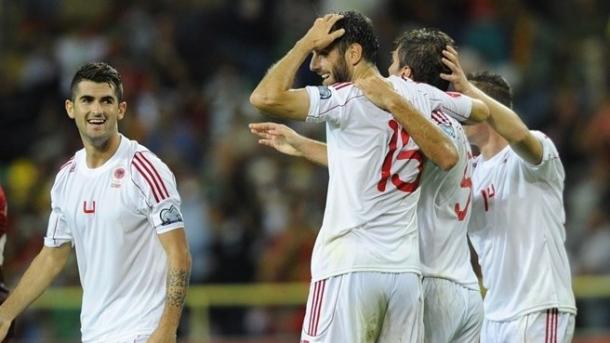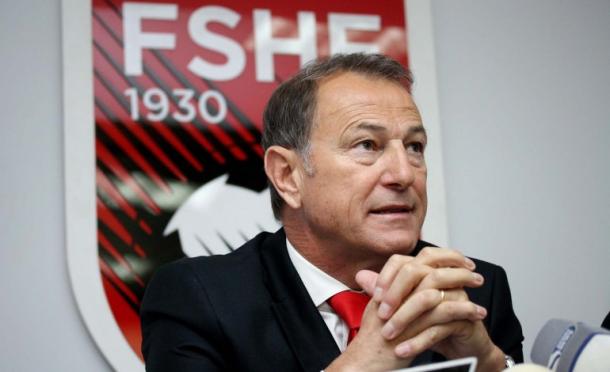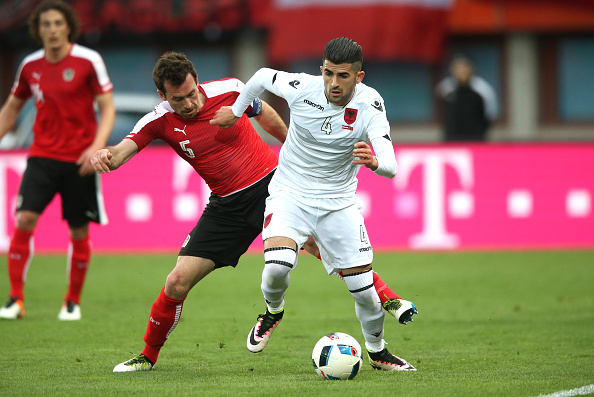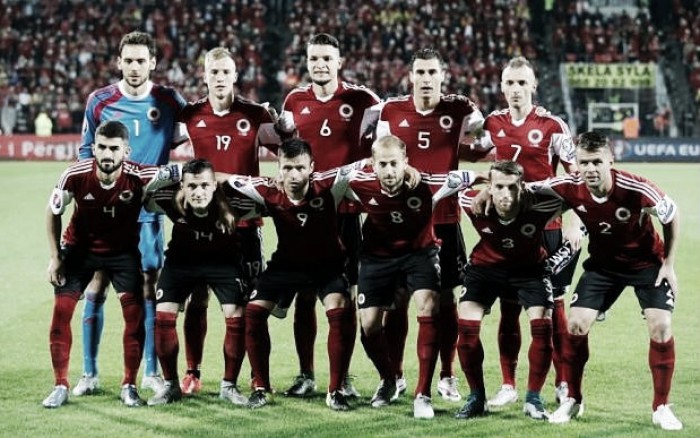Albania may be underdogs at Euro 2016, but don’t put anything past the Balkan nation who qualified for their first major tournament ahead of Serbia and Denmark.
Whilst Albania are a nation not many know about, they have players who ply their trade in some of Europe’s top leagues, including Serie A, Bundesliga and the Eredivisie.
Gianni De Biasi has worked wonders since his appointment in 2011, and at their first major tournament, Albania's hard-working mentality could see them advance past the group stage which includes France, Switzerland and Romania.
“Dearest Gianni,” said the Albanian prime minister Edi Rama to coach De Biasi the day after the national team’s qualification for Euro 2016 had been confirmed. “Words cannot express my gratitude to you.”
How they qualified?
Alongside 2004 finalists Portugal, Albania finished second in Group I with four wins, two draws and two defeats.
Bekim Balaj scored the only goal in their opening against Portugal in what was their first win against the European giants in their sixth attempt. The HNK Rijeka forward volleyed his side in the lead after 52 minutes to give Albania a shock win.

De Biasi’s side then took the lead against Denmark through Ermir Lenjani, but a late equaliser from Lasse Vibe denied Albania another three points.
Ethnic tensions in the Balkans then took the centre-stage as an incident involving a drone led to the abandonment of Albania’s game against Serbia after 41 minutes, following ugly clashes between both sets of players.
The brawl followed the arrival of the drone, which flew over the stadium whilst carrying a flag depicting the “Greater Albania.” Serbian player Stefan Mitrovic ripped the flag down, which led to the violent scenes which included fans throwing flares and missiles towards the Albania players. UEFA later awarded Albania a 3-0 victory.
Albania fell behind to Armenia through a Mërgim Mavraj own-goal, but the defender equalised 13 minutes from time before Shkelzen Gashi scored a late winner to earn De Biasi another three points.
Lazio’s Etrit Berisha was the hero as Albania came home from Denmark with a point which put them level with the Danes at the top of Group I. A Miguel Veloso late winner in added time then broke the hearts of Albania fans as they fell to Portugal before conceding two late goals in stoppage time against Serbia.
Albania then went into the final game against Armenia needing a win to qualify for their first major tournament, which led to a 3-0 away win against Sargis Hovsepyan’s team. Kamo Hovhannisyan opened the scoring in the ninth-minute via an own-goal, before Berat Xhimshiti doubled Albania’s advantage in the first half. Substitute Armando Sadiku then created history for Albania with the third, which sealed a place in the finals.
Meet the manager
After taking the reins as Albania coach in 2011, De Biasi has been instrumental in guiding Kuq e Zinjtë to their first major tournament.
The 59-year-old has previously managed the likes of Torino and Levante – saving them both from relegation – before taking over charge of Albania.

A key area that the Italian has excelled in is his man management skills. De Biasi has won back the support of former disgruntled players with the help of Lorik Cana, which ultimately was key in guiding them to France.
How do they play?
De Biasi certainly isn’t blessed with talent in comparison to their Group A opponents. The Italian has introduced a defensive style of football which worked well in their qualification process. He has been described in the past as a motivator and organiser, so viewers can expect to see a style similar to that of Greece in 2004.
A disciplined manager, De Biasi likes to play a structured approach, which will usually see a hard-working midfield, which is a major component in setting up a disciplined defence.
What are their strengths and weaknesses?
Whilst Albania could be a hard team to beat, following De Biasi’s well-drilled disciplined football – it’s their midfield that will win games for the Balkan nation.
In Sokol Cikalleshi, they have a hard-working player what also has a killer instinct in advanced positions. Pescara’s Ledian Memushaj might have just 13 caps, but the 29-year-old will sit in the heart of midfield, and again, be responsible for breaking up attacks and starting counters of their own.
The area that Albania will more than likely struggle in will be attacking positions. De Biasi’s bunker-style tactics can often backfire if their defence is breached in the opening stages, which happened in a friendly against Austria in a Euro 2016 warm-up, which saw Albania ship two goals in 15 minutes.
Dependent on set-pieces, Albania rarely score through open play, and their lack of firepower was evident in their qualifying games as they scored just seven goals in five qualifier games at one point – five of which came against bottom-placed Armenia.
Key Player
Whilst their midfield is their strongest area in the squad, Elseid Hysaj is the player who has to perform well if Albania are to advance from their group.

The Napoli defender was called up by De Biasi at the tender age of 18 and whilst the attack-minded full-back is natural on the right, the 22-year-old can also cover left-back and midfield positions.
Whilst being attack-minded, Hysaj has a great understanding of the game at such a young age, which shows with his positional awareness. Defending is just one of his traits, but the Napoli man can pick a pass when required should the opportunity arise.
Fixtures
Albania vs Switzerland | 14:00 – Stade Felix Bollaert-Delelis, Lens
France - Albania | 20:00 – Stade Vélodrome, Marseille
Romania - Albania | 20:00 – Parc OL, Lyon
Squad
Goalkeepers: Etrit Berisha (Lazio), Alban Hoxha (Partizani), Orges Shehi (Skenderbeu)
Defenders: Lorik Cana (Nantes), Arlind Ajeti (Frosinone), Berat Gjimshiti (Atalanta), Mergim Mavraj (Cologne), Amir Rrahmani (Split), Elseid Hysaj (Napoli), Ansi Agolli (Qarabag), Frederic Veseli (Lugano), Naser Aliji (Basel)
Midfielders: Ledjan Memushaj (Pescara), Ergys Kace (PAOK), Andi Lila (Giannina), Migjen Basha (Como), Odise Roshi (Rijeka), Burim Kukeli (Zurich), Ermir Lenjani (Nantes), Herolind Shala (Slovan Liberec), Taulant Xhaka (Basel), Armir Abrashi (Freiburg).
Forwards: Bekim Balaj (Rijeka), Sokol Cikalleshi (Medipol Baksasehir), Armando Sadiku (Vaduz), Milot Rashica (Vitesse), Shkelzen Gashi (Colorado Rapids)










































